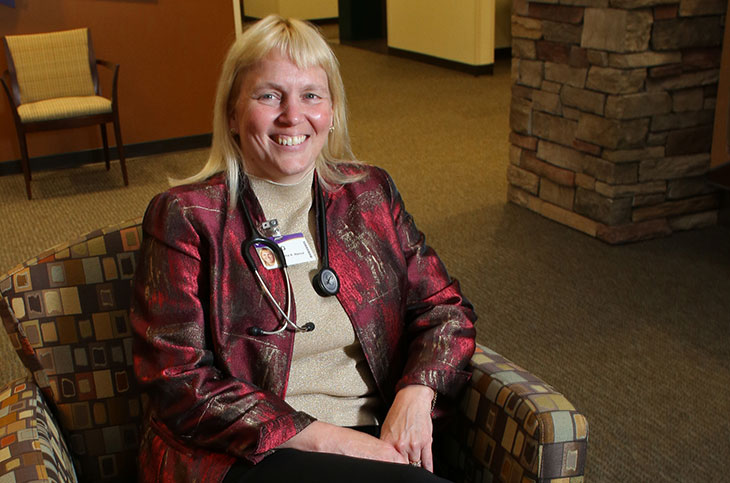Dr. Martha Nance ’76

Dr. Martha Nance ’76 has a high tolerance for problems that are not fixable. She specializes in Huntington’s and Parkinson’s diseases, which are currently incurable neurological disorders. Rather than dwell on what cannot be done, she focuses herself, her patients, and their families on what can be done to improve their lives.
“Neurology has a reputation [as a discipline] where you make brilliant diagnoses but then there is ‘nothing you can do.’ But I had a sense even [when I started in the early 1980s] that we were on the brink of an era that would change neurology, and that has been true,” Nance says.
Nance has witnessed medical advancements in neurology, including progression from the pneumoencephalogram, which she describes as a “medieval” method of injecting air into the spinal column and manipulating the patient’s body to watch the movement of an air bubble in the brain, to CAT scans and MRIs. She also witnessed the advent of genetic testing for Huntington’s disease with the identification of the causative gene in 1993.
Since 1991, Nance has been the director of the Huntington’s Disease Clinic at the Hennepin County Medical Center in Minneapolis. Since 1997, she also has been a neurologist at the Park Nicollet Clinic in Golden Valley, MN, where she has been the director of the Struthers Parkinson’s Center since 2000. In addition to seeing patients, doing clinical research and running two centers, Nance teaches, lectures and serves on committees. She is an internationally recognized thought leader on Huntington’s disease and an advocate of a team-based, education-focused approach to care.
Nance credits her success in part to her “bilingual” training in both genetics and neurology. Her father, Walter Nance ’50, a geneticist, helped her find summer work in genetics labs in high school and college, and inspired her interest in genetic disorders. At the same time, her study of Latin, Greek and French at Exeter spawned her initial curiosity about how the human brain works—why and how humans can use language. Her board certification in neurology and genetics extends her credibility among professionals, and her dual fluency gives her the unique ability to approach Huntington’s disease, a genetic disease, from both perspectives.
Unlike most other neurologists, Nance is involved with patients even before they have symptoms of Huntington’s disease, when they consider having a predictive gene test, and also cares for them throughout the course of their disease. “I have strong feelings about how to care for people with these diseases,” Nance says. When patients enter nursing homes and are no longer able to come to her, she goes to them. She has treated generations within families and developed relationships that have prompted individual and community victories within the Huntington’s and Parkinson’s communities.
Nance actively seeks balance. She enjoys mentoring high school, college and medical students. “If you connect with kids at the right moment in their lives—let them know they can do this and that we don’t already have all the answers—then they are hooked forever.”
She and her husband, John Trusheim, a neurologist specializing in brain tumors, also managed to find time to raise two sons, Matthew and Stephen, who are now in graduate school and college, respectively. In their absence, Nance tends to her 60-by-60-foot garden. “All three of my offices have veggies and flowers inflicted upon them throughout the summer. ‘Martha’s Monday Market’ is feared by all, I think,” Nance says with a laugh.
Nance graduated from the Academy at age 16; graduated from Yale at age 20; finished medical school and her residency at 24 and 28, respectively; and completed her two fellowships at 31. What distinguishes her from other doctors, however, is not her intelligence but her compassion.
“I dream of being the person who finds the cure, but in the meantime, each individual patient is a human being,” she says. “One of my mantras is that there is always something you can do for someone with Huntington’s disease, and the same is true for Parkinson’s disease. Sometimes all you can do is give them a hug, but that’s better than nothing.”
— Taline Manassian ’92